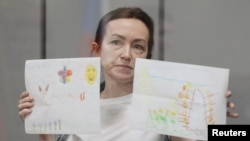Holding up children’s pictures sent from around the world, Alsu Kurmasheva draws strength from international support as she marks more than a year since she was separated from her two daughters who are back home in Prague.
It's a bittersweet reality for the jailed American-Russian journalist. The Prague-based journalist, who works for the Tatar-Bashkir Service of VOA’s sister network Radio Free Europe/Radio Liberty, has been in a Russian prison since October 2023.
Kurmasheva was informed Friday that her custody is extended until at least August 5.
Kurmasheva has largely been cut off from the world. Russia has denied U.S. consular visits, and RFE/RL says she has not been able to speak with her husband, Pavel Butorin, or their two children since her arrest.
But through her correspondence with other news outlets, a picture has emerged of Kurmsheva’s life inside a Russian cell.
When the journalist marked six months in custody this April, the Tatar-language newspaper Beznen Gaezhit, or Our Newspaper, published excerpts from one of her letters.
In it, Kurmsheva described conditions in the pre-trial detention facility in the city of Kazan, and how she spends her days.
In one section, she writes, “I don’t know what time it is; there are no clocks here, but surprisingly, you roughly still know what time it is.”
“It turns out, we know nothing about life in [prison],” the journalist wrote, adding, "I didn't need this 'experience' either."
Kurmasheva had traveled to Russia in May 2023 to care for her mother. When she tried to return to Prague on June 2, 2023, authorities confiscated her travel documents. She has been charged with not registering her U.S. passport with authorities; failing to self-register as a foreign agent; and violating military censorship laws.
If convicted, she faces a combined sentence of up to 15 years in prison.
Kurmasheva and her news network deny the charges. In her letter to Beznen Gaezhit, the journalist said she is not guilty — a fact, she added, that is “obvious for everyone.”
Russia’s Washington embassy did not respond to VOA requests for comment about Kurmasheva’s case.
The journalist’s letter reflected on the other women being held in the same detention facility.
“There are very different people here. There are those who had the misfortune to pick up someone’s lost bank card, and those who don't pay child support. There are women who ran out of strength to endure their husband's beatings — and they responded. Now they are in confinement,” she wrote.
“There are also those who legally earned money, but someone thought it was too much and didn't like their activities. I met very intelligent, well-mannered girls — students.”
Since being in prison, Kurmasheva’s health has deteriorated. Her medical concerns are an issue that she and her network have raised during court hearings.
RFE/RL President Stephen Capus said on Friday that Russian authorities are denying Kurmasheva adequate medical attention.
Culture preserved
Beyond reflecting on life inside a Russian prison, Kurmasheva’s letter to Beznen Gaezhit details her work teaching and promoting Tatar language and culture.
"For 25 years, I lived and taught children and teenagers the Tatar language. I promoted the art of Tatar designers abroad, helped organize concerts for Tatar performers,” Kurmasheva wrote. “For two decades, countless leaders of Tatarstan — doctors, teachers, and students came to the Czech Republic. I was able to help each one, giving advice and sincere wishes.”
But, she added, "In one moment, all this turned into a crime.”
Media watchdogs believe Kurmasheva’s arrest is linked to her journalism. The New York-based Committee to Protect Journalists, or CPJ, notes that the RFE/RL Tatar-Bashkir Service reports on Russia’s war in Ukraine. Police in Kazan in August 2022 questioned several RFE/RL journalists about the network’s coverage.
Additionally, CPJ said, Kurmasheva has reported on minority groups in the Russian Republic of Tatarstan.
Kurmasheva’s husband on Friday shared a post on X about his wife’s incarceration, and noted that since being detained, she has not been allowed a single phone call with her children.
Being reunited with her family, and putting the lengthy wrongful imprisonment behind her, appears top of mind in Kurmasheva’s letter to the Tatar media outlet.
"Sooner or later, I will get out of here,” she writes. But, she asks, “How will those who, by imprisoning me — a mother of two — separating us for a long time, live? How will they build their lives further?"
She adds, “I am often asked if I will write a book about what I am experiencing now. No, I will not. My greatest wish is to get out of here alive and healthy.”
Kurmasheva is one of two U.S. journalists currently imprisoned in Russia. The other, Wall Street Journal reporter Evan Gershkovich, has been in pretrial detention for more than a year.






